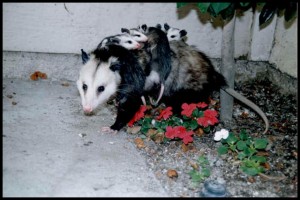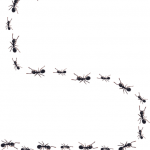READY TO GET STARTED?
REQUEST A FREE ESTIMATE
Fill out the form below or call (888) 466-7849 for a free, no-obligation estimate.
 Some people think that when the temperatures drop, they will have less pest issues. For some critters this may be true, as they use the autumn to store up for a cold winter, during which they hide away. However, some of the larger animals such as squirrels, raccoons, possums, etc., might want to use your home for a warm space to hide away from the weather. Northwest Exterminating’s Wildlife Team knows just what to do in order to keep your home a pest-free zone!
Some people think that when the temperatures drop, they will have less pest issues. For some critters this may be true, as they use the autumn to store up for a cold winter, during which they hide away. However, some of the larger animals such as squirrels, raccoons, possums, etc., might want to use your home for a warm space to hide away from the weather. Northwest Exterminating’s Wildlife Team knows just what to do in order to keep your home a pest-free zone!
Depending on what type of animals may be in your area, they can leave you susceptible to various issues. For instance, some squirrels like to make nests in attics, using your insulation as material! The costs of repair plus the hazards of a potential electrical fire due to damaged wires makes it really necessary to block this area off from potential unwanted guests. Aside from squirrels, other creatures have the potential to do damage in the form of bites or fleas that might affect your children or pets.
To reduce these risks against you, Northwest’s Wildlife Team specializes in wildlife exclusion. One of form of wildlife exclusion involves sealing up any potential openings to secure your home. The Wildlife Team will inspect your home, evaluating potential problem areas and implementing measures to eliminate these issues. However, if by chance your home has already gotten unsolicited attention from these pests, the Wildlife Team knows just what to do to take care of your home and prevent the issue from happening in the future. If you need a Wildlife representative, please contact us at 888-466-7849 or visit our website www.callnorthwest.com
Source: http://ezinearticles.com/?The-Importance-of-Wildlife-Exclusion&id=7352650
Melissa Brown
[email protected]
 There are over 700 species of ants in the US so it is no surprise that ants are the number 1 reported nuisance pest in the US. But according to Pestworld.org there are 6 simple steps that can help you reduce the invasion of ants in your home. Click on the links for more explanation from pestworld.org.
There are over 700 species of ants in the US so it is no surprise that ants are the number 1 reported nuisance pest in the US. But according to Pestworld.org there are 6 simple steps that can help you reduce the invasion of ants in your home. Click on the links for more explanation from pestworld.org.
Read the full article HERE and contact a licensed pest professional to get rid of ants in your home. Call Northwest Exterminating to get rid of ants and other pests that are invading your home or business.
Source http://www.pestworld.org/news-and-views/pest-articles/articles/six-steps-to-an-ant-free-home/
Watch out pests, it’s National Pest Control Awareness Month and the Georgia Department of Agriculture (GDA) Commissioner Gary W. Black is reminding Georgia residents to protect your homes and businesses from pests. Read the GDA’s recent press release for more tips and information on how to keep your home free from pests.
State Ag Commissioner reminds residents to protect homes, businesses
Spring has sprung in Georgia. This season is always a busy time for insects and pests in Georgia, but it is especially the case after such a mild winter. In honor of National Pest Control Awareness Month in April, Georgia Department of Agriculture (GDA) Commissioner Gary W. Black reminds residents about the risks posed by household pests.
“We are already seeing more insects and pests earlier this year due to the warm winter Georgia has had,” said Commissioner Black. “Every year, pests cause millions of dollars in damage for our residents and it is important for Georgians to prepare a plan of action to help prevent damage from occurring.”
In addition to fees paid for control and preventative services done by pest control professionals, Georgia residents spend untold dollars to repair damage caused by pests such as termites, rodents and carpenter ants who chew through walls, flooring and even electrical wiring. Residents also pay for expenses related to the treatment of medical conditions; mosquitoes can carry West Nile virus while house dust mites and cockroach allergens trigger asthma attacks, and stinging insects send more than half a million people to the emergency room every year.
“I encourage all Georgians to take proactive steps to prevent infestations in their homes and businesses,” said Commissioner Black. “All it takes is a few simple, preventative measures to help protect year-round.”
In April, consider these tips and suggestions:
– Trim back trees and shrubs so they are not physically touching any building structures;
– Walk the perimeter of a structure’s foundation and seal up any cracks or small openings;
– Install window and/or door screens and check once a year for holes or tears;
– Keep wood debris and piles of wood (including firewood) at a distance;
– Check plumbing and pipes to eliminate sources of moisture or standing water;
– Tightly secure all food and garbage to prevent pests from finding their way to the source (this includes pet food dishes and storage containers); and
– If there are any visible signs of pests or an infestation, contact a licensed pest professional immediately.
“April is a great time to have your home or business checked to determine if it’s necessary to re-establish any pest control measures, such as termite protection” said Commissioner Black. “And if control or treatment is necessary, that is one homeowner project best left to the professionals.”
Consumers are urged to only seek advice and use licensed professional pest control companies. If a company is not licensed by the GDA, it is illegal for them to practice pest control protection as a business. Residents can find a list of all licensed professional pest management companies at www.kellysolutions.com/GA/Structural/searchPCOCo.asp, or contact the GDA Structural Pest Section at 404-656-3641.
Note: Consumers can learn more about Pest Control Awareness Month, the GDA’s Structural Pest Section and hear from industry partners in a short video clip available on the Department’s website homepage starting April 1: www.agr.georgia.gov.
The Georgia Department of Agriculture is responsible for licensing the professional pest management companies who perform termite control. There are approximately 1,200 of these companies operating in Georgia. Learn more online at www.agr.georgia.gov.
Disclaimer: The following are general guidelines to follow and do not constitute medical advice.
Spring brings with it flowers, pollen, birds and bees! But it also brings pests that are returning from their winter break. For many of us, mosquitoes are a real problem that keeps us from enjoying the outdoors. But more importantly, mosquitoes can carry diseases such as West Nile Virus and Eastern Equine Encephalitis Virus. They can also cause heartworm in dogs. *Click here for a brief outline on these diseases* These diseases are very serious but fortunately, rarely directly related to mosquitoes.
In General
In general, the problem with mosquito bites is due to an allergic reaction to the mosquito’s saliva and the problems associated with swelling and scratching of the mosquito bite. When a mosquito bites you they inject saliva which helps keep the blood from clotting. The saliva causes an inflammatory reaction which causes the itching and swelling associated with the bite. Most people just get a big irritating lump on the skin which if they scratch becomes more swollen and lasts longer. But some people actually have an allergic reaction to the mosquito saliva and can become very ill.
For the itching and swelling, anti-histamines are recommended. Diphenhydramine (commonly known as Benadryl – TM) can be used orally or applied in creams or lotions combined with calamine. Anti-inflammatory steroid creams may help too – creams like 1% hydrocortisone.
Interesting Fact: Only female mosquitoes bite and suck blood to obtain protein for their eggs; male mosquitoes suck nectar.
Impetigo
Even if you don’t get sick from the mosquito, many people scratch their bites until they bleed. When the skin is open it is susceptible to secondary infection. Children and adults can get a skin infection called impetigo which is a superficial skin infection caused by bacteria called staph and strep. Impetigo causes open sores and crusting (honey colored) and swelling in the areas. Impetigo is usually worse in the summer when children are out playing in the dirt, getting bitten by mosquitoes, and then getting those sores infected. Excellent hygiene (SOAP and WATER) can prevent most impetigo and cure mild cases. Over the counter antibiotic ointments (like Bacitracin) can help too as well as prescription ointments like mupurocin. There may be enlarged glands in the area, fever, and a spreading rash. Usually more severe impetigo needs an oral antibiotic so contact your doctor if you think you have impetigo and need medicine for it.
Heartworm
Man’s best friend can be affected with heartworms which are also transmitted by mosquitoes. So protect your entire family against these pests.
Prevention
The best prevention is to eliminate mosquitoes from your environment. Since this is virtually impossible to do completely, several strategies should be employed:
Give your family the best protection against mosquitoes by calling Northwest Exterminating for their Green Mosquito Control Program. Be sure to ask for your FREE inspection!
Thanks,
Dr. Goo